The first time my family went to Mexico I was four years old. When we drove across the border to Baja, I saw a man walking along the road, rolled down my window, and yelled COMO ESTA USTED? as loud as I could. My older sisters shrank down into their seats, mortified. But the man smiled, tipped his cowboy hat, and waved as we passed.
It worked! You could say secret words and other people would understand them. I didn’t care that I looked foolish, I just wanted to try out those foreign words.
I never got over that sense that speaking another language is magic, a key to another world that opens up more and more with every new word. So when people down here in San Miguel de Allende, Mexico, where I am now, ask me how it is that I speak Spanish so well, I think, How could I not? I’ve been coming down here for 15 years and being able to speak Spanish makes it so much more fun, easy, and interesting. Speaking the language is the only way to better understand a culture and its people, which is why you’d spend more than tourist time in another country in the first place.
When Mexicans compliment me on my Spanish, I’m pleased, but also aware of how many Mexicans speak English fluently and no one thinks it’s such a big deal. Billions of people around the world have mastered a second language—English—and we never think, Wow, amazing.
What’s hard for me to understand are expats who have been in Mexico as long as I have, but full-time, who barely speak enough Spanish to get their needs met —food, cleaning, transportation—but not enough to truly communicate. Some gringos down here try to learn some Spanish, maybe take a three-week course, and then give up. Some don’t even do that. I once helped a woman at a deli counter down here order cheese because she couldn’t speak Spanish. I asked her how long she’d been here, and she said 18 years. Imagine: 18 years, and you can’t even order queso. That strikes me as not only spectacularly inconvenient, but boring because you can’t get to know three-quarters of the people who live here. You end up living in your own American burbuja. (As for the people in this town who think that all the Mexicans they encounter should speak English, well, Yankee Go Home).
A lot of people say they are just bad at learning languages, they don’t have a talent or an ear for it. I get it, learning languages is not everyone’s taza de te. But whatever innate talent you have for anything—math, dance, music—never goes anywhere unless you work at it. I’m not criticizing those people; even my wonderful husband Peter claims he’s no good at learning Spanish. But if he spent a fraction of the time working on Spanish that he does practicing music scales, he’d be at least conversational in no time. But it’s not his focus, and that’s fine; it’s not his fault he married a woman with a house in Mexico. But I don’t buy that anyone who is so blazingly good at crossword puzzles can’t master another language. Like anything else, it’s just a matter of desire, and practice.
The flip side of people saying they can’t learn another language is saying that people who do speak other languages have a talent for it. People often accuse me of having an innate ear for languages. In addition to Spanish I speak fluent (if somewhat rusty) Italian, and a smattering of French. If I lived in Europe, that would be absolutely normal, even a bit sub-par. Also, I only speak romance languages, which are similar enough that after the first one, they’re easier to acquire. Learning languages with completely different structures and tones is another thing entirely.
My uncle John spoke so many languages—nine, I think—that I suspected he was in the CIA. I once asked Uncle John how he knew so many languages, and could keep track of which words went with which language. He made it look easy, but then, he looked like Fred Astaire to begin with. He told me that it was all about the accent. “Once you have the accent, you get into the groove that’s worn in your brain, like a record,” I recall him saying.
My uncle John Gould spoke nearly a dozen languages and looked like Fred Astaire.
Uncle John studied languages, and the people who spoke them. He had been getting his PhD at Harvard in physics, but then Einstein came to campus and met with the doctoral candidates and somehow scared them all from continuing because of the evil that the atomic bomb had unleashed on the world, so Uncle John left. That is another story, but he ended up bumming around Europe, and with nothing to do with a mere MA in Physics, learned a bunch of languages and supported himself by teaching before he landed a job working for an international bank. The point is, he applied himself as much to learning languages as he did to doing physics equations. Obviously, he was quite intelligent, but you can sit around being smart all day and never accomplish a damn thing if you don’t work at it (the notion of talent, in fact, hinders a lot of smart people from trying things, because they think if they fail then they really aren’t smart and talented after all, and that hurts the core of their identify).
My friend Rachel Meyer, in addition to speaking Spanish, French, and Catalán, is also so fluent in Chinese that when she speaks she stops looking Irish and you believe she is Chinese (in fact, she once starred in a soap opera produced for China). She also speaks Turkish and probably a bunch of others I don’t know about. She owns a language school, appropriately enough, called ABC Language, which I highly recommend if you’re serious about learning another language. But there’s the rub: you have to be serious.
My polyglot friend Rachel Meyer and me in Barcelona. She speaks Spanish with a perfect lisp, while my accent is Mexican with a tinge of Italian.
I asked Rachel about the talent thing. I myself have accused her of being brilliant, which she always answers by saying that she just works hard. It’s true: She is constantly reading books in other languages, taking classes, and going to Meet-ups with people who speak other languages. “Talent is not required at all,” she says, and points out, as I mentioned, that people all over the world learn English, often because they have to for work. “If you’re in Bangladesh and can make 100x the pay if you know English, you’re going to learn English,” she says. “Everyone who has traveled has met people who may only have an elementary education but they can speak decent English.”
So what’s the problem with Americans? “Number one, we don’t teach foreign languages well in the U.S.—we don’t give it enough time,” Rachel says. Second, “Most English speakers can get by usually in travel and business —we don’t 100% need another language.” And of course, unlike other parts of the world, the US is big and fairly isolated; it’s not like you need a new language to visit Maine or North Carolina.
But the worst thing, Rachel says, is our narrative that another language is too difficult and you have to have talent to learn. “They tried it in high school, and came out not being able to speak,” she says. While she says some people do indeed pick up pronunciation and grammar more easily than others, anyone can learn — with time, consistency, and motivation.
But that’s not how learning languages is being sold in the US right now, where social media ads, like weight loss ads, promise quick results. “The biggest misconception perpetuated by the industry right now is that this is going to be fast, you can learn a new language in three months,” Rachel says. “It’s a terrible message, because when they aren’t fluent in three months, they give up.”
No: It takes time, a book, a teacher, online resources, and, of course, practice speaking. “You can’t just stick your head in a book, you have to get out and talk to people,” she says. Of course, immersion in another country is the best way to learn.
If all that effort sounds like a drag, think of your motivation. The ability to buy cheese, get around or have a conversation that isn’t just about how much something costs and how many tacos you get with your order.
I always practice Spanish whenever I can, like with taxi drivers.
Speaking Spanish gives me so many little moments of pleasure. I took a taxi today and chatted with the driver about all the new development, the water situation here, the rain, and then he asked me my name.
“Laura.”
He shook his head, like he was fed up or disappointed.
“Que? I asked. You don’t like the name Laura?”
“Well,” he said. “My ex-wife is named Laura.”
“Disculpa,” I said. Sorry.
“I also had a girlfriend named Laura.”
“Pues, será mejor que tenga cuidado,” I joked (note the subjunctive tense). I’d better be careful.
He laughed, and asked me where I was from, and then what my name was in the U.S. I said it was the same, but the pronunciation is different. “Es LOREa, no LAUra. Suena mucho más feo. Por eso, prefiero estar en países latinas.” My name sounds ugly in English, which is why I prefer to be in Latin countries.
A boring silent taxi ride turned into a fun conversation. Once, chatting with another taxi driver, the driver told me his wife was a chef, and they ended up cooking a meal for about eight of my friends a few days later. It was fabulous —marinated pork, homemade tortillas, chiles in cream, an orange cake.
See what you miss?
It took a lot of work to become fluent and to be able to joke in Spanish. It did not come quickly or easily, but it was a pleasure.
I had a head start, because when I was ten, my family went back down to Mexico, this time to San Miguel de Allende. My mother, bless her, wanted us kids to experience another culture, learn a bit of another language, and understand that not everyone in the world lives like doctor’s daughters in Denver. People ask me why I ended up living part-time here instead of someplace else, possibly somewhere less full of gringos and expats, and it’s because I never chose the place, I just landed here. We spent a summer going to language classes with a woman who fascinated me, because she was about 4’10” and her braids went all the way down to her knees and doubled back up to her ears.
We came to San Miguel de Allende in the 70s because my Mom wanted us kids to learn another language and be exposed to another culture.
At ten years old, you are a sponge. I was also unafraid to try to talk to other kids, and to make mistakes. So what if they laugh at you? This is a little odd, because I’ve never been very good at talking to strangers in English; I feel self-conscious. The speaking-to-random-people, on-the-street type of reporting has always been my big failing as a journalist. But somehow, in Spanish, I feel more relaxed, maybe because people realize I’m making an effort to communicate.
Then, like most everyone else, I took a few years of Spanish in high school. All I can remember are worksheets. I agree with Rachel that how we teach Spanish, at least back then, isn’t good. I suspect it still isn’t, because when my stepdaughter came down to San Miguel de Allende, she didn’t speak much, even though she was pretty good at the language on paper. When I asked why she didn’t try to just talk, she said, “In Spanish class, they stop us when we make mistakes and correct us.” Now that’s a mistake. People should just try to communicate, and flail around words until they get their point across. A teacher can point out corrections later. I don’t remember actually speaking much in Spanish class at all, though in AP Spanish in high school we were reading excerpts from Borges, Fuentes, Márquez, and other Spanish-language authors. That was rough going —read two words, look up one— but reading is key to learning vocabulary, of course.
I took one more semester of Spanish in college, but that was it. After college I backpacked around the Mediterranean, including a month in Spain, and that’s where the book learning started to mesh with my willingness to speak and sound like a fool. My Spanish improved quite a bit. I also had a boyfriend there for a while, and spending long periods of time with someone, especially someone who is patient because he wants to sleep with you, in my experience, is a great way to learn a language, although the vocabulary is a bit particular.
I kind of took a break from Spanish, except for speaking a bit in the Mission District in San Francisco when it seemed appropriate (I almost never initiate a conversation in Spanish in the US because it may seem insulting, like I don’t think they speak English). In my 30s, I turned to learning Italian. Again, I took a lot of night classes, spent an entire semester on the “If I were, I would” construction of the subjunctive plus the conditional, went to Italian meet-ups, made friends with Italians, spent a month in Florence, and then kept going back. At home I watched English movies with Italian subtitles and vice-versa. Then, after my first husband left me, I went to Italy to recover and met Michel, a French professor who didn’t speak English and I didn’t speak French. We continued to see each other for a few years and stayed friends to the end of his life. I called my first memoir An Italian Affair, and wrote it in a style that mimicked people speaking in a second language, because we spoke Italian to each other.
Then in 2007 I got an assignment to go to Mexico to write about expat women reinventing their lives in San Miguel de Allende for More magazine, and I ended up reinventing my life a little by impulsively buying a lot and building a little house down here. I could communicate, but I was frustrated that most of the people I spoke to were waiters, a housekeeper, gardener, and others who were more service people and employees than friends. So many people speak English down here —Mexicans joke that there should be signs around town that say “Se Habla Espanol” — that it was hard to immerse myself in the language. I did make some Spanish-speaking friends in dance classes, though, which was a good start.
I wanted to be able to keep up with people like Anja, the architect who designed my house, with her friends. I hung out with them more, which was a strain, especially when you’re used to being quick in conversation. It’s hard to feel like a dolt, something I went through with my Italian friends, too.
So I kept on studying. I began to watch Spanish movies, and to read in Spanish. It’s sometimes difficult to read books in Spanish that I would otherwise read in English, so I started with easier mysteries and chick-lit type books, with contemporary vocabulary. I’d read on my Kindle with the Spanish dictionary installed so I could just look up words while I read. Right now I’m reading an Isabel Allende book, El Viento Conoce Mi Nombre, and don’t have to look many words up. But I tried to read Pedro Páramo by Juan Rudolfo, which my intellectual friends recommended and Gabriel Garcia Márquez was so moved by that he learned the whole novel by heart, and it was so full of dated language and time changes and fantasy that I had to go back to my old technique of reading a page in English, then rereading it in Spanish. Slow going, but worth it.
I made a rule for myself that I would speak Spanish in Mexico whenever I could. When someone would answer me in English, I’d answer right back in Spanish. “Estamos en Mexico, no?” I pay close attention to people’s accents, and I repeat words to myself, trying to get the sounds right. Learning languages is never a straight path toward accomplishment. At this point, my conversational Spanish is better than my Italian, but my accent is better and I read faster in Italian. Still, my Spanish accent is finally becoming good enough that Spanish-speaking people don’t always immediately take me for a gringa. One once asked me if I was Cuban, and another if I grew up in Mexico. Yessss!
Most importantly, despite the fact that there is a large English-speaking expat community here, I now mostly interact with Mexicans. One of the main reasons I’m in Mexico is that I like Mexicans.And among expats, I like the ones who speak good Spanish best; they, too, have made a big effort to communicate and to immerse themselves in the culture. I have to give huge thanks to my Mexican friends, especially Beatriz (who speaks French but refuses to learn English because she doesn’t think everyone in the world should have to), Angélica, who teaches literature, and Marie, a dance friend, who have been incredibly patient with me and have corrected my Spanish. It makes a huge difference to speak regularly to people who are well-educated and well-read. Now I am—finalmente—able to talk about art and ideas with Mexican gallery owners, writers, and artists, which makes life here so much more rich.
So, yes, thank you, my Spanish is good, but it’s not like I just flipped that Innate Talent for Language switch and was able to motor-mouth en español. It’s taken a lot of time and work, but it brings me more than compensating pleasure. And I’m still nowhere near a native level. There are millions of idiomatic expressions in Spanish, for instance, that I don’t know, especially since they change from country to country. Just today I learned a delightful one: Bailando ni quien me lo quita.
Next month I am going to Italy for the first time in several years. I’ve got to switch grooves in my brain and do a lot of reading before then to brush up. There’s no endpoint to learning a language, “It’s not like someday you’re pronounced “fluent” and that’s it,” as Rachel says. You have to keep at it.





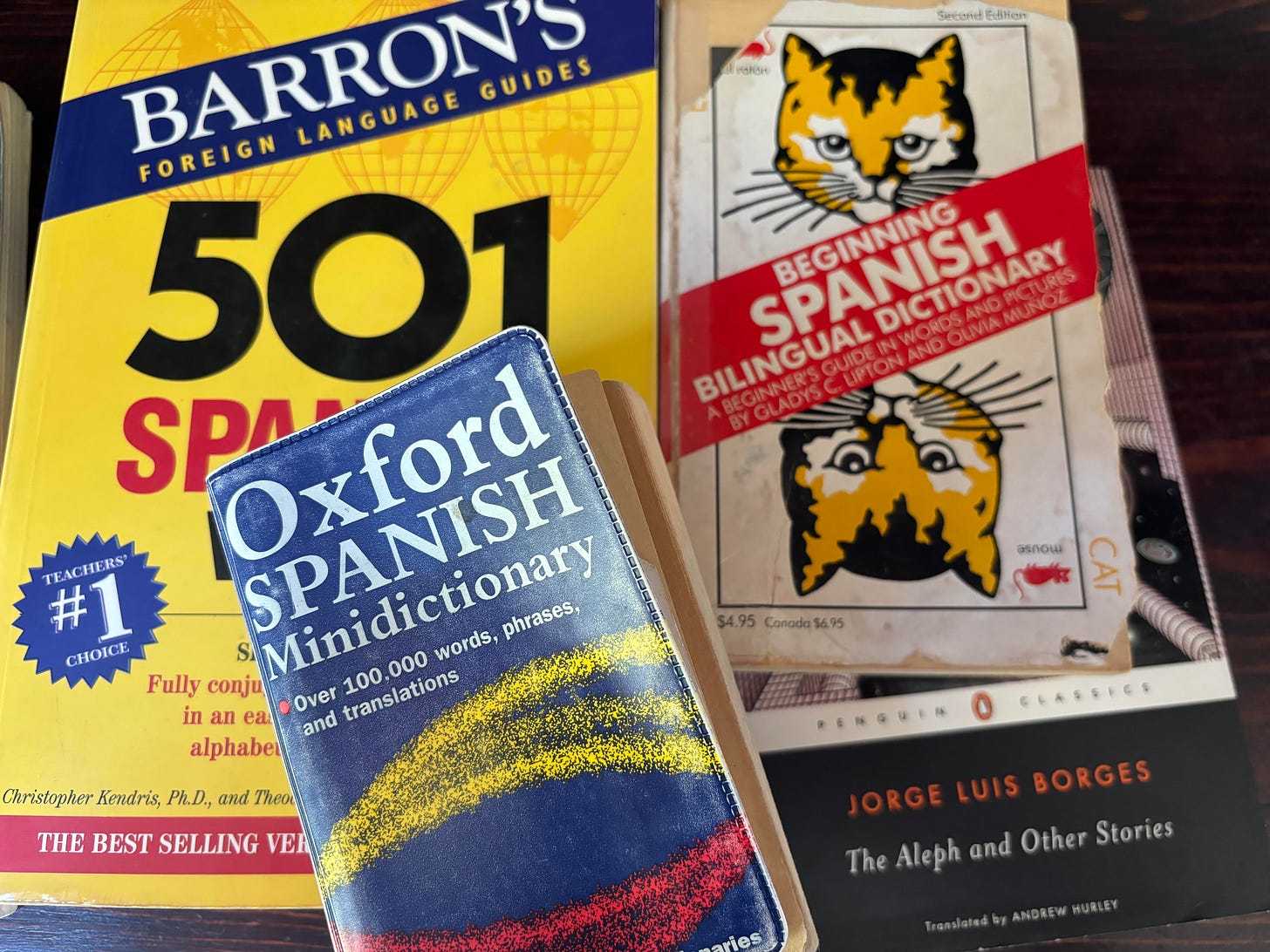

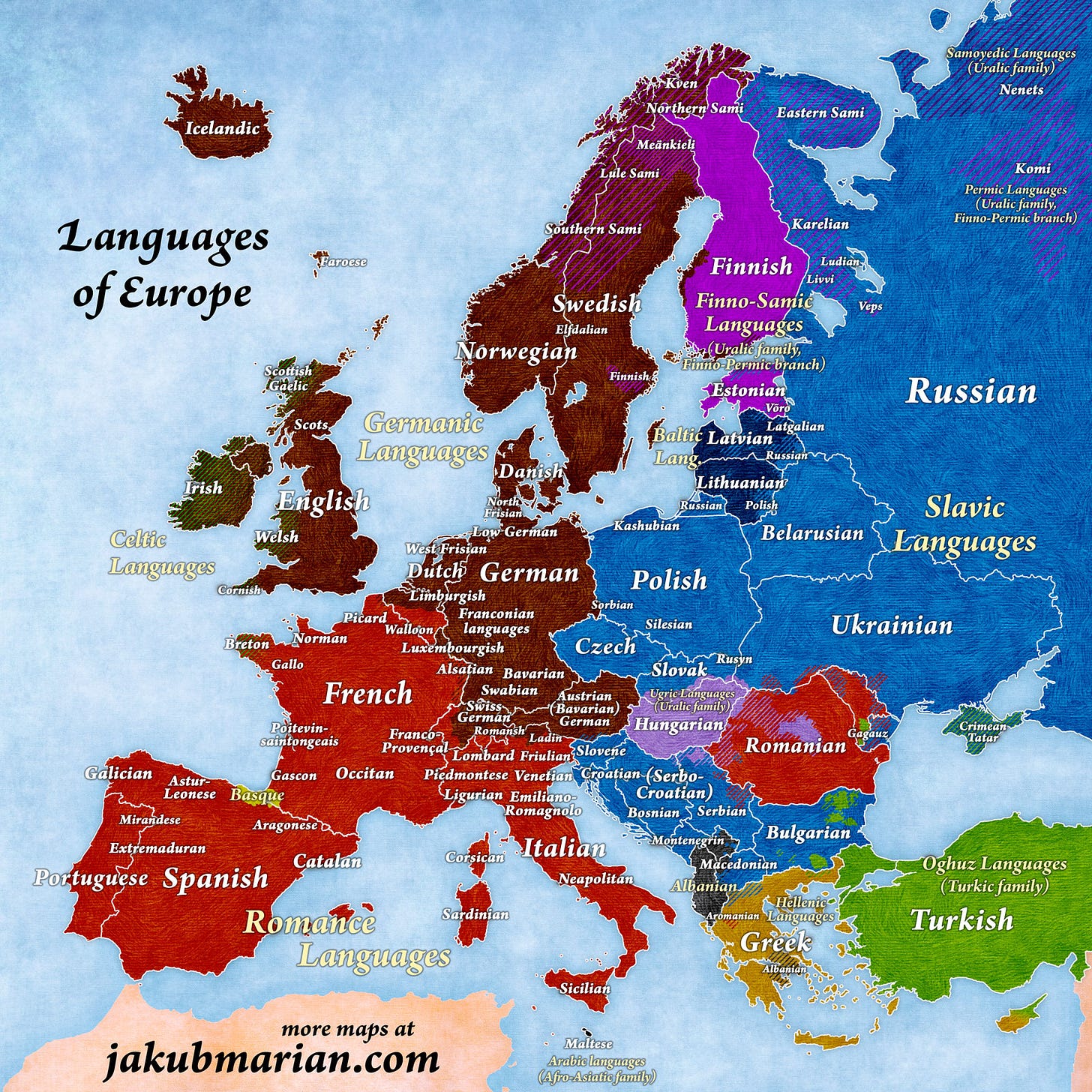
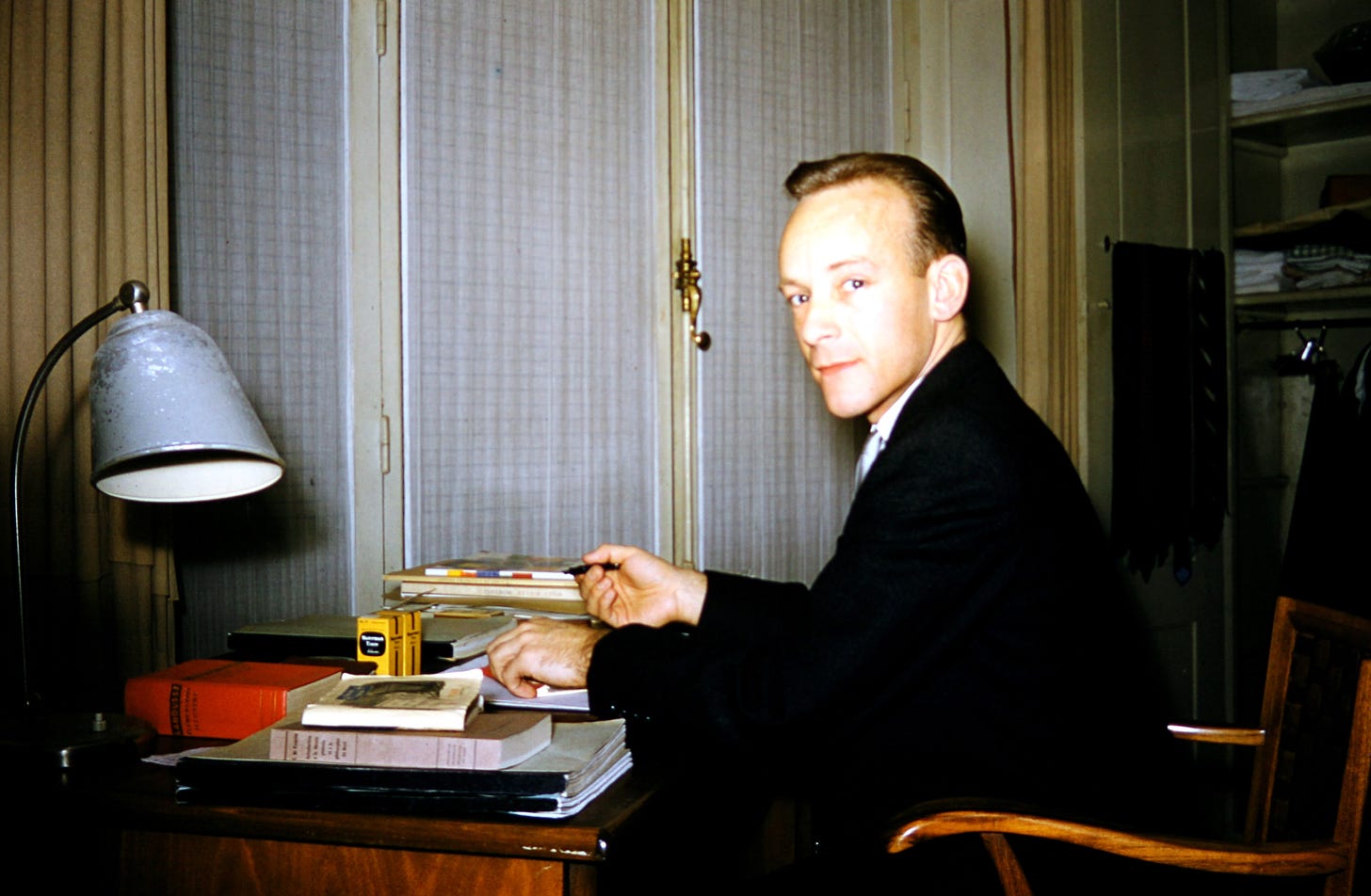
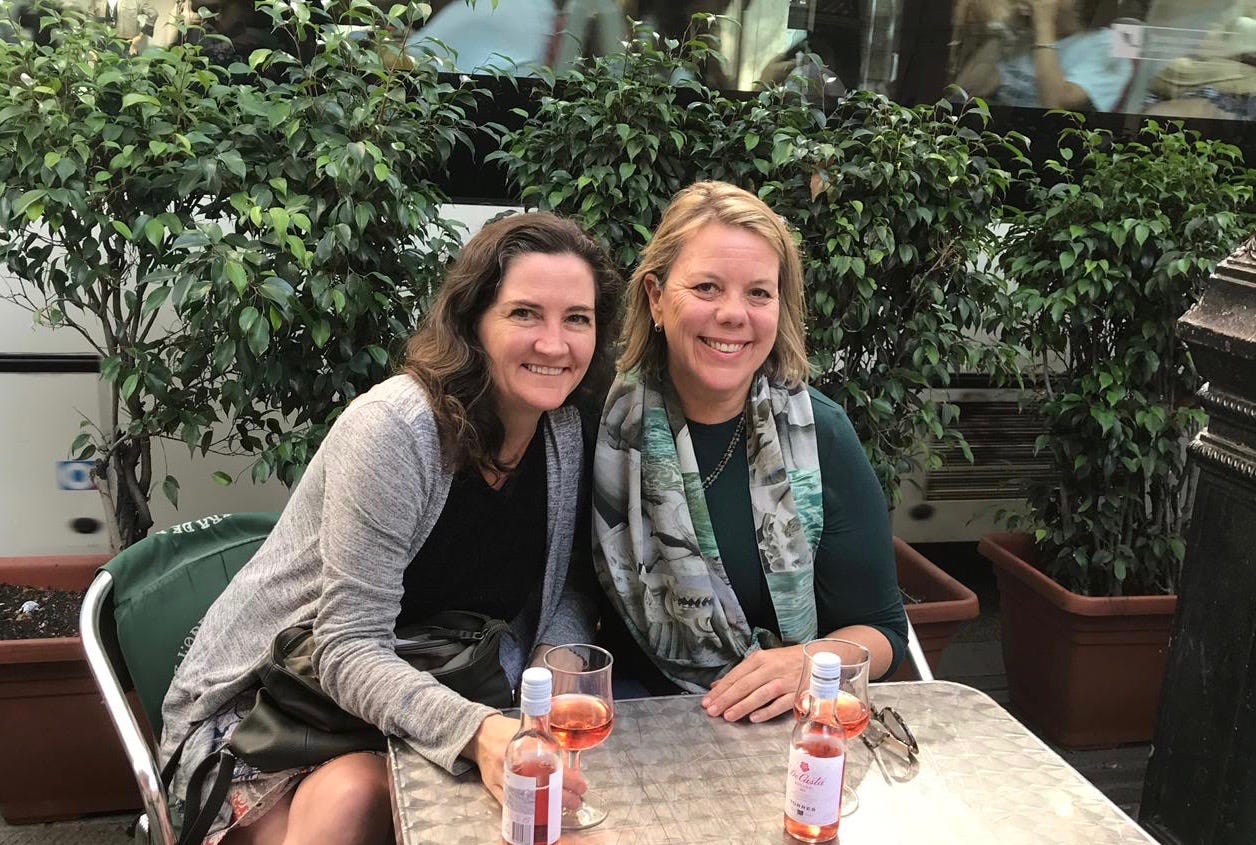
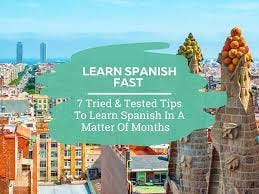


That WAS a fabulous meal. 😉